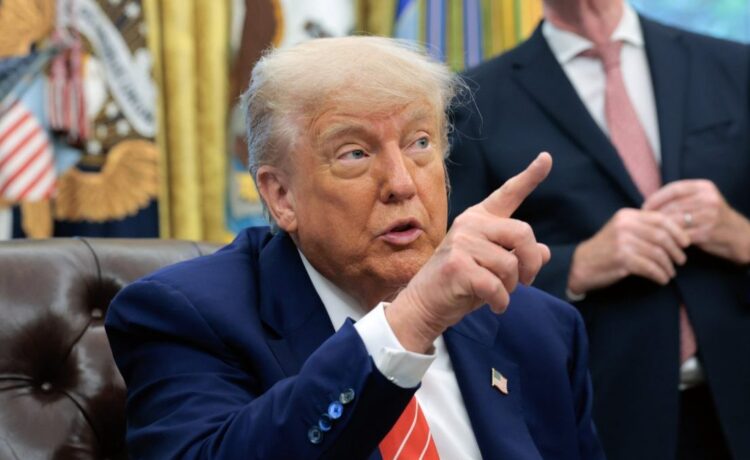A new UK-US trade agreement has been unveiled, marking the first major economic pact between the two countries since Donald Trump’s return to the White House.
While the deal stops short of a full free trade agreement, it includes measures to ease long-standing trade tensions and shield the UK from the impact of Trump’s wide-ranging tariff regime.
Sir Keir Starmer signed off on the deal late on Wednesday after a week of intensive talks between negotiators concluded in Washington DC.
“This is a really fantastic, historic day, in which we could announce this deal between our two great countries,” the Prime Minister said as he announced the plans.
“This is going to boost trade between and across our countries. It’s not only going to protect jobs, but create jobs,” he added, claiming the deal is built on “the notions of fairness and reciprocal arrangement”.
The concessions are among the first major deals Trump has struck since he announced dozens of steep tariffs on key trading partners.
This policy imposed a universal 10 per cent tariff on imports from most countries, including the UK, from 5 April. Specific sectors also face higher rates, with exports of steel, aluminium, and automobiles being subjected to a 25 per cent tariff.
While the immediate impact on UK households will be modest, the deal struck today could help save thousands of British jobs in the automotive, steel and pharmaceutical sectors, which were set to be hit hardest by the tariffs.
Here are the key details that have been announced so far:
Car and steel tariffs
Under the UK-US trade agreement, the 25 per cent tariff previously imposed on British steel exports to the United States is expected to be lowered to zero.
Meanwhile, a 10 per cent tariff will be implemented on 100,000 cars sold to America – a drop from the current 27.5 per cent rate.
The initial tariffs announced by America would have made British products less competitive in the US market, and were widely criticised by UK industry groups when they were announced.
The change could prove especially important for the UK’s automotive sector, which exported around £6.4bn in vehicles to the US last year. It may also help support British steelmakers, who have struggled with high energy costs and international competition.
While this forms a significant part of the new agreement, there is no indication yet that a wider deal covering other sectors is imminent, and it’s understood that talks regarding this sector will continue in the near future.
What this means for you
Consumers in the UK are unlikely to see direct price changes, but the move could help safeguard jobs in car manufacturing and steel production, particularly in areas heavily reliant on these industries.
Over time, a more stable export market may support wages and investment in manufacturing regions.
No ‘chlorinated chicken’ concessions
The trade agreement does not appear to include any UK concessions on food safety standards, including for imports such as chlorinated chicken and hormone-treated beef.
This outcome may reflect concerns in the UK over consumer confidence in food imports, despite efforts by US negotiators to secure greater access for American agricultural products in the British market.
Howard Lutnick, US Secretary of Commerce, said that new market access will be opened for ethanol, beef and “all agricultural products” traded between the two countries.
Trump said: “They’ll also be fast-tracking American goods through their customs process, so our exports go to a very, very quick form of approval, and there won’t be any red tape.”
What this means for you
Shoppers in the UK will continue to see food standards regulated under existing British rules, with no change to the type or quality of meat sold in supermarkets.
The absence of concessions may also reassure consumers wary of US farming practices.
No tax breaks for Elon Musk
The UK’s 2 per cent digital services tax, which applies to large multinational tech firms operating in the UK, such as Elon Musk’s X, remains unchanged under the new agreement.
The levy, introduced in 2020, targets companies with global revenues above £500m and UK digital services revenues exceeding £25m. It affects firms such as Google, Amazon, Meta and X, which generate substantial advertising and platform-based income in the UK.
The US Government has long opposed the tax, arguing that it unfairly targets American tech giants and could distort international trade.
The measure was not included in this deal despite speculation that the UK might agree to reduce or eliminate the tax in exchange for concessions elsewhere.
What this means for you
For ordinary consumers, the direct impact of this levy is expected to remain limited, although critics of the tax argue that some companies could pass costs on to users.
Tech firms themselves have not commented on any immediate changes following the deal.
Pharmaceutical exports
While the US has vowed to give the UK’s pharmaceutical industry “preferential treatment“, negotiations remain ongoing.
There are currently no US tariffs on medicines, but trade officials have reportedly been monitoring possible regulatory changes.
Pharmaceuticals are the UK’s second-largest export to the US, with annual sales totalling around £6.6bn. The sector includes both large multinational firms and smaller research-led companies based across the UK.
These assurances may be intended to give UK drugmakers more stability amid shifting US trade policies. However, without formal treaty obligations, the long-term effect remains uncertain.
Any changes to the regulatory environment or future tariff policies in the US could still impact UK pharmaceutical exports.
What this means for you
UK patients are unlikely to see any immediate change in access to medicines.
However, if the agreement helps maintain smooth exports and regulatory cooperation, it could support continued investment in British pharmaceutical research and production, which may benefit the wider healthcare sector over time.





